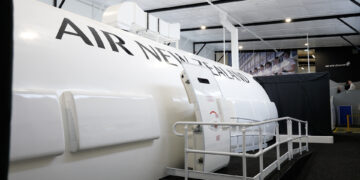What airlines wish they had in the disruption toolkit
Hurricane Helene and a brief IT outage for Alaska Airlines are just the latest disruptions delaying – and often grounding – flights.
Disruptions are said to cost the industry $60 billion annually, a substantial amount in an industry suffering from thin margins. And while airlines say passenger communication and greater personalization are challenges, there are technologies and processes leaders believe would help them better navigate disruptions.
Asking airline executives what tops their wish list when it comes to managing these events inevitably throws up a lot of wants. From a technology perspective, airlines want self-service apps for passengers and decision making support, driven by artificial intelligence, to bolster best outcomes. They also would prefer if disruption was recognized as more important within their respective carriers. And, executives would like a more joined-up approach to the issue involving airlines, airports and any other stakeholders.
The wants and needs were discussed at the Grounded in Iceland event, which was hosted by Plan3 earlier this month. There, Evert Gramsbergen, head of passenger and operations control at Transavia, said he would like to see disruption management “become more central” in airline operations with higher budget allocated to help solve it.
He believes airline board members and leadership teams need to place more value on the issue to start.
“Disruption management is the stuff that gets into the newspapers, so that’s where we can make a big difference,” he said.
For Yvonne DeSilva, director of operations control at Aer Lingus, the mobile app and decision support are important but so too is cohesive thinking.
“I also want, that when the decision is made, it feeds out to our handling agents, our boarding agents and anyone that needs to know about the disruption… I also think we need to join our thinking as an industry because it’s much bigger than airlines. We can put all these fancy systems in place and if it’s not joined up thinking, at the airport etc., it doesn’t work.
Research conducted by Reykjavik University shared at the Grounded in Iceland event revealed that passengers want to be seen as individuals and given options including self-service when something goes wrong.
The power of sorry
Valdimar Sigurðsson, a professor at the university’s Centre for Research in Marketing & Consumer Psychology, said that even intangible actions such as an apology or explanation that don’t cost an airline much but make a difference to passengers should be considered, alongside tangible actions.
His advice was to address low-hanging fruit, “the things that don’t cost a lot to do but create a lot of value” and can be implemented despite legacy systems and slim margins.
The university’s research, carried out through interviews, choice experiments, segmentation and predictive analysis, revealed that 72% of passengers prefer to receive an apology and or an explanation if something goes wrong. And, while 15% of passengers are happy to get their information from airport boards and staff, 85% would opt for mobile updates every 30 minutes and the option to help themselves via a mobile device.
He said that flight disruptions are happening more not only because of the increasing number of passengers but also weather-related events. Airlines are also being held to account more, he said, pointing to the recent United States Department of Transport legislation compensating passengers for delays and cancellations.
Sigurðsson said the whole area of passenger disruption and recovery is “crazy under-developed” with research from Accenture revealing that only half of travel companies have developed a robust disruption management system and only 37% offer mature self-service data and insight tools.
Subscribe to our newsletter below
While some of the wishes from airlines to address the gap are already being implemented or in the pipeline depending on where carriers are in the disruption management journey, others require more thinking and work.
Brighter future on the horizon
There is optimism, however. Simon Dempsey, chief commercial officer of Plan3 said that while passenger disruption management hasn’t really changed for decades, right now the industry is in a “perfect storm of tooling, processes and mindset to transform the outcome by design.”
Gramsbergen supported the view and said Transavia is developing a related toolset but that the airline needs still to invest in the skillset.
“We need to train people to work differently. We haven’t spent too much on training and helping people to think differently.”
He also touched on the importance of having the three elements of tooling, processes and mindset in place because “if you only have one of the three, it’s not going to work, they need to be running in parallel.”
Often progress is hampered by legacy systems. Bart De Groote, head of ground operations support at Brussels Airlines, said that while improvements can be made, legacy systems do get in the way and can mean only solving “one tiny piece at a time.”
DeSilva said airlines need not be limited by their systems and can work towards being a “human airline” alongside processes, something that is in the DNA of Aer Lingus, she said.
“You can change your DNA to say that actually you have five tools in your toolkit that you can use regardless of systems. Regardless of whether it’s a snowstorm, volcanic eruption or a pilot strike, there are these five things we can do, we can cancel, we can delay, we can hire in etc. If you get your people into that mindset, you aren’t necessarily limited by your systems.”
One of the things Brussels Airlines has done during its transformation is scrap all the ways disruption is described in favor of passenger recovery which was a “mindset change,” according to De Groote.
He also spoke about the leap needed to digitalize “mandatory care, mostly in the hotel and ground transportation sections,” as well as the need to have all the data accessible in one place.
“My data is scattered over 20 different systems,” said De Groote. “We need to do some landscaping to really have a good, solid structure to build on for decision making and AI.”
The airlines stressed the importance of having protocols in place to follow when disruption occurs in addition to the need to learn and improve on processes each time a disruption arises.
Gramsbergen said evaluation is an important piece in the wake of major disruptions to create better protocols for the next disruption especially with incidents becoming more frequent.
For Aer Lingus, meanwhile, disruptions have become a standard to consider, according to DeSilva.
“You have to build a disruption meeting in to every week, even for the smallest disruption, one flight. A standard meeting that everyone has to go to so you’re learning.”
*Reporter’s attendance at the event supported by Plan3.














































